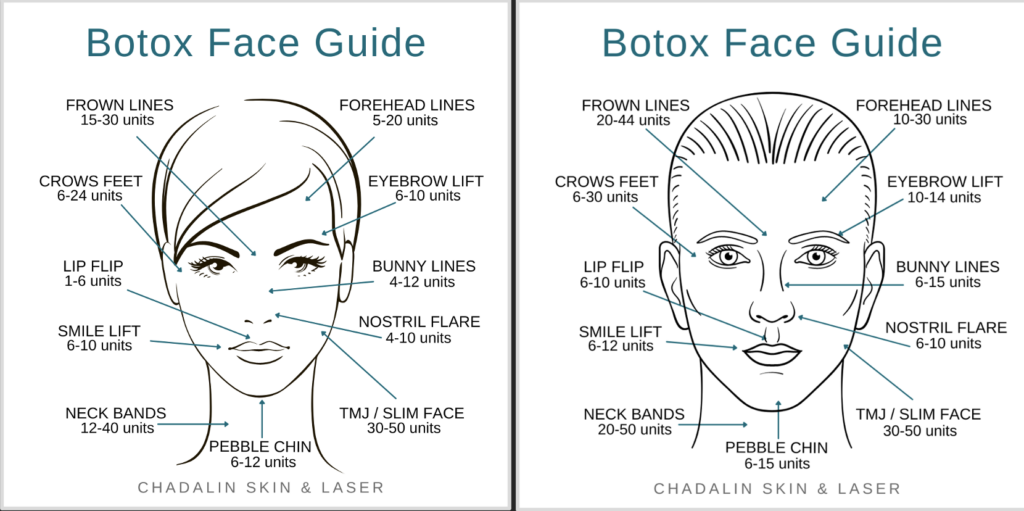WHAT IS BOTOX: HOW TO KNOW IF IT’S RIGHT FOR YOU
Neuromodulators are a purified natural protein derived from the bacterium clostridium botulinum. This means that neuromodulators are not a toxin or a bacteria that is injected but rather a purified protein. This means that you can NOT get botulism. The most common neuromodulator is Botox but there are a few others as well, including Dysport, Nuceiva, and Xeomin. They all work in similar ways and the preferred product is usually chosen by the medical professional. Dr. Venter’s first choice is Nuceiva but also offers Botox or Dysport.
Botox was the first Health Canada approved Neuromodulator for cosmetic use, in 2001. Before then it was used to treat strabismus, commonly referred to as lazy eye. More studies were done and more conditions were approved for treatment. Such as:
– Migraine treatment
– Hyperhidrosis – excessive sweating of the underarms, hands and feet
– TMJ or jaw clenching
These treatment costs are often covered by extended medical care.
Neuromodulators or Botox have become the joke of many movies and depicted as a frozen face with features that are completely different from what the person actually looks like. This is absolutely not true. When neuromodulators are administered correctly, it should simply give you a refreshed, well rested look.
How does Botox work?
It prevents the signal from the nerve to the muscle which causes the muscle to temporarily stay in a relaxed state. This inhibits the movement of the muscle that causes wrinkles over time.
Why choose a neuromodulator treatment like Botox?
The treatment can improve your overall look in a very natural way. We are all aging with each day that passes. The idea is not to fight the aging process or to look like we are 18 at 40.
Let’s compare it with going to the gym or doing any form of exercise. We go to the gym to gain muscle, or to live a healthier lifestyle. It is also fair to say that going to the gym for a week will not really do anything for your health, rather it should be a lifelong commitment. The same goes for skin treatments like Botox. Studies have shown that doing these treatments increases elasticity, a component of healthy skin. By using neuromodulators we can treat the well known “resting b$#@ face” or the all too common “WTF” lines between your eyebrows. Those can run pretty deep even for a young person. When your frown lines are ALWAYS there and people think you are ALWAYS in a “mood” even when you are not, it might be affecting your mental health.
We have all seen the filter used where your face looks like you’re crying with the corners of your mouth turning downward. This is a natural progression of aging that has been exaggerated by the filter. When you look in the mirror and these make you feel sad, it might be time to do something about it. Don’t get me wrong. The smile lines around my eyes are my pride and joy. It shows that I have lived but when it starts to have a negative effect on my mood, the decision is pretty easy to do something about it.
An article was published in July 2020 about botox injections that may lessen depression. When we look at our overall health, it is also important to look at skin health and the impact it has on our mental health.
8 commonly asked questions:
1. I don’t want to look fake or surprised. How can I avoid this?
Choose a trusted and certified medical professional. Just because the injector is a doctor does not mean they are trained in cosmetic procedures. Make sure the medical professional has experience and is always keeping their skills up with ongoing training. A one weekend training session does NOT make you a trusted injector.
Dr. Venter has been a cosmetic injector since 2012. He has had extensive follow up training throughout the years and is still getting more training to learn all the techniques for safe injections.
2. How long does it last?
This is dependent on each individual and their metabolism but on average Neuromodulators last between 3 and 4 months.
3. When should I start getting Botox?
This is a very personal and individual question and there isn’t one right answer. Botox can be used as a preventative treatment. Meaning that before the lines are set in and static or really deep. Treatment will be at a lower dosage to prevent those lines from forming in the first place. Preventative treatments are also at a way lower cost as less is needed for each area.
4. How much will it cost?
There are a few factors to this question. Age of client and desired result. Here is a diagram showing on average how much is needed per area of the face. We charge $10 per unit with Dr. Venter and $9 per unit with our qualified nurse injector Kymberly.
5. If I do it once, do I have to do it forever?
Absolutely not. You can choose to get the treatment done every 3 months forever or just one time and never again. This is absolutely your personal choice.
6. Will my facial features be altered or bigger after injections?
No. Botox does not add volume to any area of the face. It does not change any of your own natural features. The goal is to look refreshed and rested. We want your friends to ask if you just came back from a relaxing holiday.
7. How long does it take to work before you see results?
On average results can be seen between 7 and 10 days. This depends on person to person and on the product used.
8. How painful is it?
Minimal
Dr. Venter has a very unique way of doing these injections. He uses individual needles for each injection site. This ensures the needles are sharp which make the treatment very comfortable. When you use the same needle for multiple injection sites, the needle tip becomes dull and can cause more pain. The individual needles also ensure the exact amount of product is used for each area injected which increases accuracy. Below is a picture of a needle under a microscope to show what happens with the needle after multiple injections.
As with all cosmetic procedures we always recommend a free no obligation consultation. All your questions will be answered at this time. You may find that Neuromodulator treatments are not the right fit for you. After all, this is a medical treatment, and you need to make the decision that best suits you.
Kind Regards
Linda




